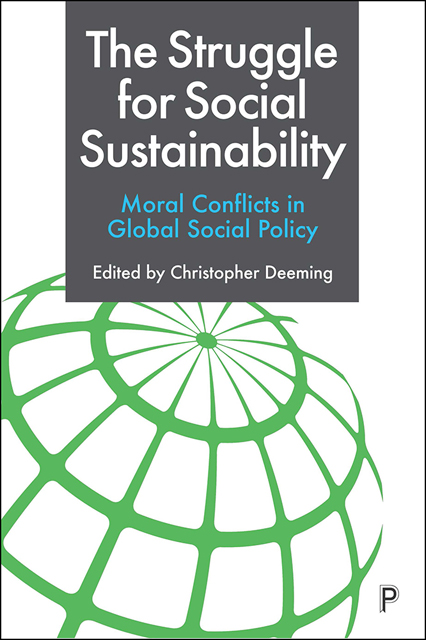Book contents
- Frontmatter
- Contents
- List of boxes, figures and tables
- List of abbreviations
- Notes on contributors
- Acknowledgements
- Preface
- 1 The ‘social’ in the age of sustainability
- 2 ‘No such thing as society’? Neoliberalism and the social
- 3 The social question: reconciling social and economic imperatives in policy
- 4 Disputing the economization and the de- politicization of ‘social’ investment in global social policy
- 5 The social dimension of sustainable development at the UN: from Brundtland to the SDGs
- 6 Paradigm lost? Blocking the path to ecosocial welfare and post- productivism
- 7 World population prospects at the UN: our numbers are not our problem?
- 8 Ageing sustainably
- 9 The political challenges to governing global migration and social welfare
- 10 Bringing in ‘the social’: an intersectional analysis of global crises and welfare
- 11 Global social policy and the quasi- concept of social cohesion
- 12 Putting the global in social justice?
- 13 ‘Go- social’? Inclusive growth and global social governance
- 14 For better or worse?
- 15 The struggle for social sustainability
- Index
3 - The social question: reconciling social and economic imperatives in policy
Published online by Cambridge University Press: 14 April 2023
- Frontmatter
- Contents
- List of boxes, figures and tables
- List of abbreviations
- Notes on contributors
- Acknowledgements
- Preface
- 1 The ‘social’ in the age of sustainability
- 2 ‘No such thing as society’? Neoliberalism and the social
- 3 The social question: reconciling social and economic imperatives in policy
- 4 Disputing the economization and the de- politicization of ‘social’ investment in global social policy
- 5 The social dimension of sustainable development at the UN: from Brundtland to the SDGs
- 6 Paradigm lost? Blocking the path to ecosocial welfare and post- productivism
- 7 World population prospects at the UN: our numbers are not our problem?
- 8 Ageing sustainably
- 9 The political challenges to governing global migration and social welfare
- 10 Bringing in ‘the social’: an intersectional analysis of global crises and welfare
- 11 Global social policy and the quasi- concept of social cohesion
- 12 Putting the global in social justice?
- 13 ‘Go- social’? Inclusive growth and global social governance
- 14 For better or worse?
- 15 The struggle for social sustainability
- Index
Summary
Introduction
In its original form, the ‘social question’ referred to the welfare of workers in the Second Industrial Revolution. As the scale of production grew in the late 19th century, and as people increasingly left the countryside to perform wage labour in urban areas, fundamental questions of social democracy and equity came to the fore. How would the rights of labour be established against the power being concentrated in the hands of capital? Would working class people have the right to vote? Should workers have bargaining power through unions? All of these questions grew from the underlying question of what share of the total output the workers deserved and whether (or how) they would receive that fair share.
At the same time, another set of nascent social questions arose about the welfare of workers that went beyond the basic question of their right to a fair share of what they helped produce. The second social question arose from the tendency of capitalist economies to cycle through periods of boom and bust. Periods of boom drew workers into the huge new factories, and periods of bust threw them into unemployment. Thus, in addition to the questions about workers’ basic rights in the new vertically integrated industrial landscape, there were questions of the fate of those displaced by the cyclical nature of capitalist production.
The third social question, relating to inclusion and sustainability in the 21st century, provides a chance to consider how traditional Keynesian ideas once again bear relevance in the continued attempt to balance our economic and social life, with capitalism again plunged into another crisis from the COVID-19 pandemic. The social questions, then, are the focus of this chapter.
The first social question
The economic theories of the early 19th century offered little hope that workers could earn higher wages. In the models of the classical economists such as David Ricardo and T. Robert Malthus, wages were always driven down to the subsistence level. Hence, the idea of economics as the ‘dismal science’.
- Type
- Chapter
- Information
- The Struggle for Social SustainabilityMoral Conflicts in Global Social Policy, pp. 55 - 72Publisher: Bristol University PressPrint publication year: 2021



